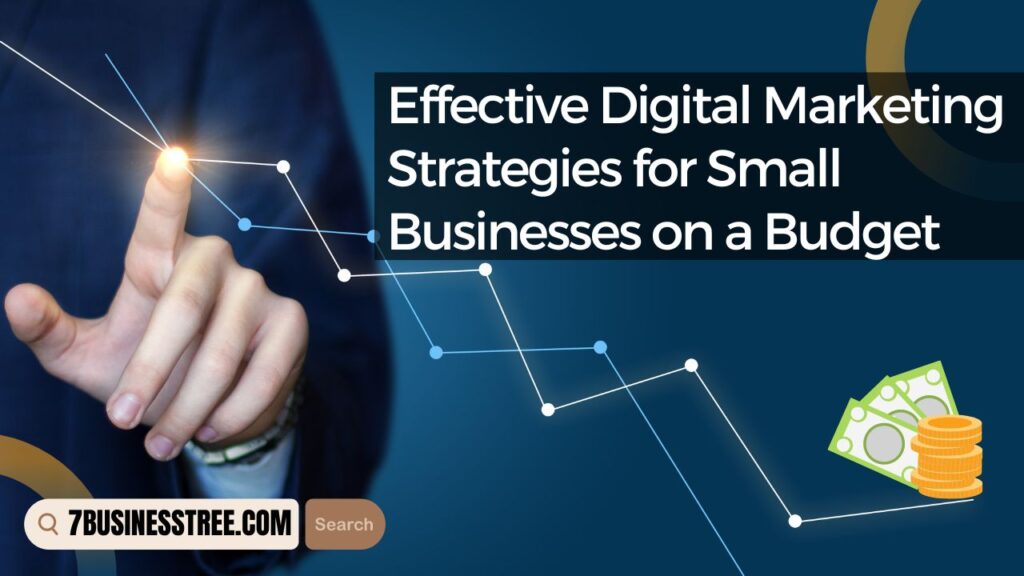In today’s digital era, small businesses must leverage smart, cost-effective digital marketing strategies to thrive in a competitive market. With the right approach, even a business with a limited budget can create a significant online presence, attract customers, and drive sales. In this article, we will explore the most Effective Digital Marketing Strategies for Small Businesses on a Budget.
1. Understanding Your Audience
Knowing your target audience is the foundation of any successful marketing strategy. Understanding who your potential customers are, their needs, preferences, and pain points enables you to tailor your messaging to resonate with them. Tools like Google Analytics, Facebook Insights, and Surveys can help gather valuable insights into your audience’s behavior and preferences.
2. Content Marketing: Create Value for Your Audience
Content marketing is one of the most cost-effective ways to engage your audience and build brand authority. By creating high-quality, relevant content, you can attract and engage your target audience without a massive budget.
Types of Content to Focus On:
- Blog Posts: Regularly updating your website with informative and keyword-rich blog posts can boost your organic traffic and improve search engine rankings.
- Infographics: These visually appealing pieces of content are highly shareable and can help convey complex information in an easy-to-digest format.
- Videos: Video marketing is increasingly popular and can be done on a budget using tools like Canva, Animoto, or even your smartphone.
Focus on SEO-optimized content to ensure that your posts rank higher on search engines and attract more visitors organically.
3. Social Media Marketing: Leverage Free Platforms
Social media is a powerful tool for small businesses to reach their audience without spending heavily on advertising. Platforms like Facebook, Instagram, Twitter, and LinkedIn provide excellent opportunities to engage with your customers and showcase your products or services.
Tips for Effective Social Media Marketing:
- Consistency: Post regularly to keep your audience engaged and build brand recognition.
- Use Hashtags: Incorporate trending and relevant hashtags to increase the visibility of your posts.
- Engage with Your Audience: Respond to comments, messages, and mentions to build relationships and trust with your followers.
4. Email Marketing: Build and Nurture Your List
Email marketing is one of the most cost-efficient digital marketing strategies, providing a high return on investment (ROI). By building a targeted email list, you can send personalized messages to your subscribers and keep them updated on your latest offers, news, and promotions.
Effective Email Marketing Strategies:
- Segment Your Audience: Tailor your messages based on the interests and behaviors of different subscriber groups.
- Automate Campaigns: Use tools like MailChimp, Constant Contact, or HubSpot to automate your email campaigns and save time.
- Personalization: Personalize your emails with the recipient’s name and relevant content to increase open rates and engagement.
5. Search Engine Optimization (SEO): Enhance Your Visibility
SEO is crucial for improving your website’s ranking on search engines like Google. By optimizing your website’s content, structure, and technical elements, you can increase organic traffic and reach more potential customers.
Key SEO Techniques for Small Businesses:
- Keyword Research: Use tools like Google Keyword Planner, Ahrefs, or Ubersuggest to find keywords relevant to your industry.
- On-Page Optimization: Optimize meta titles, descriptions, headers, and image alt texts with target keywords.
- Local SEO: If you operate a local business, make sure your website is optimized for local search with Google My Business, local keywords, and positive customer reviews.
6. Influencer Marketing: Collaborate with Micro-Influencers
Influencer marketing doesn’t have to be expensive. Partnering with micro-influencers (those with a smaller, but highly engaged audience) can be a cost-effective way to promote your products or services. Micro-influencers often charge less than celebrities and have a more authentic connection with their followers.
How to Leverage Influencer Marketing on a Budget:
- Identify Relevant Influencers: Look for influencers within your niche whose audience aligns with your target market.
- Offer Free Products or Discounts: Instead of paying a fee, offer free products or services in exchange for promotion.
- Collaborate on Content: Work with influencers to create authentic content that showcases your brand.
7. Pay-Per-Click (PPC) Advertising: Maximize Your Ad Spend
PPC advertising allows you to display ads on search engines and social media platforms, and you only pay when someone clicks on your ad. This strategy can be highly effective, even with a limited budget, if done correctly.
Tips for Cost-Effective PPC Advertising:
- Set a Daily Budget: Limit your spending by setting a daily or monthly budget that fits your financial capacity.
- Target Specific Keywords: Focus on long-tail keywords that have lower competition and higher conversion rates.
- Use Geo-Targeting: Show your ads to people in specific locations to avoid wasting your ad budget on irrelevant audiences.
8. Networking and Partnerships
Building relationships with other businesses in your industry can lead to collaborations, guest blogging opportunities, and cross-promotional activities that can benefit both parties. Networking can help you reach new audiences without a large advertising spend.
How to Build Effective Partnerships:
- Attend Industry Events: Join webinars, conferences, and networking events to connect with other business owners.
- Collaborate on Content: Partner with complementary businesses to create joint content that provides value to both of your audiences.
- Cross-Promote: Exchange promotional opportunities with businesses that share a similar target audience.
9. Customer Reviews and Testimonials
Positive reviews and testimonials play a crucial role in building trust and credibility for your business. Encourage satisfied customers to leave reviews on platforms like Google My Business, Yelp, and your social media pages.
Strategies to Get More Reviews:
- Ask for Feedback: Promptly ask for reviews after a successful sale or interaction with your customer.
- Incentivize Reviews: Offer small incentives like discounts or freebies to customers who leave reviews.
- Showcase Testimonials: Display positive customer testimonials prominently on your website and marketing materials.
10. Utilize Free Marketing Tools
There are numerous free or low-cost digital marketing tools that can help you manage, analyze, and optimize your marketing efforts. These tools can save you time and money while providing valuable insights into your campaigns.
Top Free Digital Marketing Tools for Small Businesses:
- Google Analytics: Track website traffic and user behavior.
- Hootsuite: Manage your social media accounts in one place.
- Canva: Create professional-looking graphics and marketing materials.
- MailChimp: Run email marketing campaigns with ease.
Conclusion:
Effective digital marketing for small businesses on a budget is entirely achievable with the right strategies. By focusing on understanding your audience, creating valuable content, leveraging social media, optimizing for search engines, and using cost-effective tools, you can build a powerful online presence without overspending.
Faq’s (Frequently Asked Questions)
1. What are the most effective digital marketing strategies for small businesses on a budget?
The most effective digital marketing strategies for small businesses with limited budgets include content marketing, social media marketing, email marketing, search engine optimization (SEO), influencer marketing with micro-influencers, and pay-per-click (PPC) advertising. These strategies focus on maximizing your reach and engagement without the need for large financial investments.
2. How can small businesses use SEO to improve their online presence?
Small businesses can use SEO by optimizing their website’s content with relevant keywords, creating high-quality and informative blog posts, optimizing meta titles and descriptions, focusing on local SEO, and building backlinks. These practices help increase organic traffic and improve search engine rankings, making it easier for potential customers to find your business online.
3. Is content marketing really effective for small businesses?
Yes, content marketing is one of the most cost-effective strategies for small businesses. By creating valuable and relevant content like blog posts, infographics, videos, and guides, you can attract and engage your target audience, establish your brand as an authority in your industry, and drive organic traffic to your website.
4. How can I use social media to promote my small business on a budget?
To promote your small business on social media, focus on platforms where your target audience is most active. Regularly post engaging content, use hashtags to increase visibility, engage with your followers, and utilize the free features available on these platforms like Facebook Groups, Instagram Stories, and LinkedIn Posts. Consistency and interaction are key to growing your presence organically.
5. What is the best way to build an email list for small businesses?
To build an email list, offer a valuable incentive like a discount, free eBook, or exclusive content in exchange for signing up. You can also use sign-up forms on your website, pop-ups, and social media channels to encourage visitors to join your list. Segmenting your list helps in sending personalized messages that resonate with your audience.
6. Are paid ads worth it for small businesses on a limited budget?
Yes, paid ads can be highly effective for small businesses if executed properly. Focus on platforms like Google Ads and social media PPC campaigns, set a clear budget, target specific keywords, and use geo-targeting to reach your desired audience. Start with a small budget and gradually increase it based on the performance and ROI of your ads.
7. How can I collaborate with influencers if I have a small budget?
Look for micro-influencers in your niche who have a smaller yet highly engaged following. These influencers often charge less or may even collaborate in exchange for free products or services. Building relationships with these influencers can help you reach a targeted audience without a huge financial investment.
8. What are some free digital marketing tools for small businesses?
Some popular free digital marketing tools include:
- Google Analytics for tracking website performance.
- Canva for creating graphics and visuals.
- MailChimp for email marketing.
- Hootsuite for social media management.
- Google Keyword Planner for keyword research.
These tools are easy to use and can significantly boost your digital marketing efforts without any extra costs.
9. How can small businesses improve their local SEO?
To improve local SEO, create a Google My Business profile, include local keywords in your content, encourage satisfied customers to leave positive reviews, and make sure your business’s name, address, and phone number (NAP) are consistent across all online platforms. This will help your business appear in local search results and attract more customers in your area.
10. Why is customer feedback important for small businesses’ marketing strategies?
Customer feedback is crucial because it builds trust, credibility, and helps improve your products or services. Positive reviews and testimonials can be showcased on your website and marketing materials to attract new customers. Encouraging feedback also provides insights into areas that need improvement, which is essential for long-term business growth.


